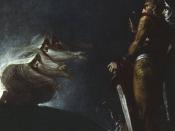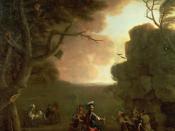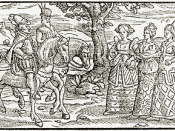A variety of paths can lead a play to its tragic end. More importantly is the character who sets forth all the tragedy. In William Shakespeare's Macbeth, Macbeth brings the tragedy upon himself and to the entire play through his greed and envy. This results in the disastrous sequence of events.
Literary tragedy typically describes a conflict between two forces, particularly the protagonist and a superior force. The conflict having a conclusion which invokes sorrow, pity and perhaps some terror. The four supernatural witch scenes add an element of chaos and confusion to the play with their dark, brooding evil. They set the mood. A significant aspect of literary tragedy is the downfall of the protagonist and what caused the downfall. Macbeth's own lust for power, fueled by his wife's greed, brings about murder and mayhem. Evil ultimately leads to Macbeth's undoing.
Literary tragedy does not necessarily differ from common tragedy.
The idea is still the same. Whether a real person is experiencing tragedy or a character is, it does not matter. Characters are modeled after people, in turn having realistic occurrences in Macbeth's case. The basis for tragedy is similar in literature as it is in everyday life.
Macbeth is a tragic character from all angles. He is the protagonist, Macbeth is the personification of greed and resulting evil. He kills the king to seize the throne for himself and continues to murder to protect himself from discovery. His conscience and guilt are the antagonists, which are the causes of his undoing. Macbeth is a character of powerful contradictions.
When we first encounter Macbeth he is a man of high stature, throughout the play we see him go step by step toward tragedy. The witches initiate by tempting him with the idea of becoming king. Lady Macbeth helps him overcome hiss natural hesitation to commit murder. Macbeth can't seem to think for himself he is easily manipulated by others, but he himself chooses between his honor and the crown. He is never able to enjoy his time as king because of his complicated feelings, he experiences nothing but anguish. He is afraid of Banquo because Banquo knows about the witches and because the witches predicted that his descendants would be king. He kills Banquo along with Duncan, Fleance manages to escape and Macbeth slaughters Macduff's entire family which is a senseless act since he doesn't gain anything but more guilt. He even incriminates himself. He is left dead with no feelings or emotion even when he hears that his wife committed suicide he reveals the total emptiness of his life. He tortures himself to madness. His own greed and guilt defeat him. All that he is left in the end with is his pride. Macbeth loses track of the difference between "Fair is foul, and foul is fair."ÃÂ We see Macbeth's tragic figure unravels right before our eyes.
The play ends in tragedy, for the main character loses his battle with himself. He let his imagination pursue him, he had trouble distinguishing between truth and appearances and this confusion contributed to his fear and ultimate end. The sorrowful events are brought upon only by Macbeth along with the aid of his manipulators, and so the play ends in tragedy.





